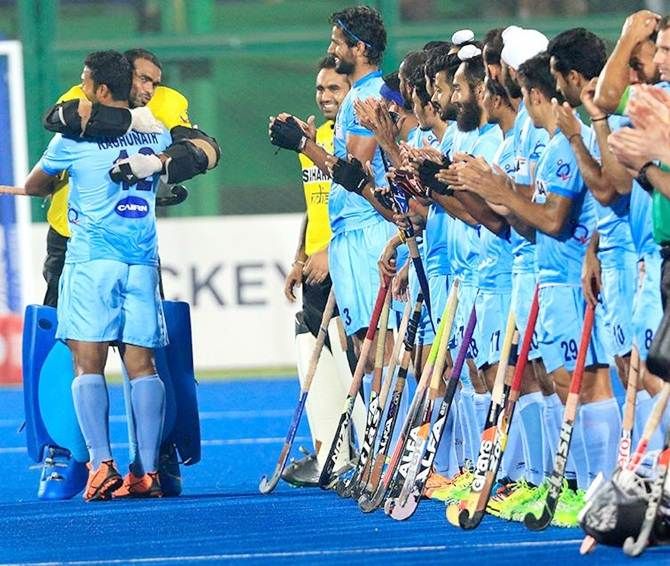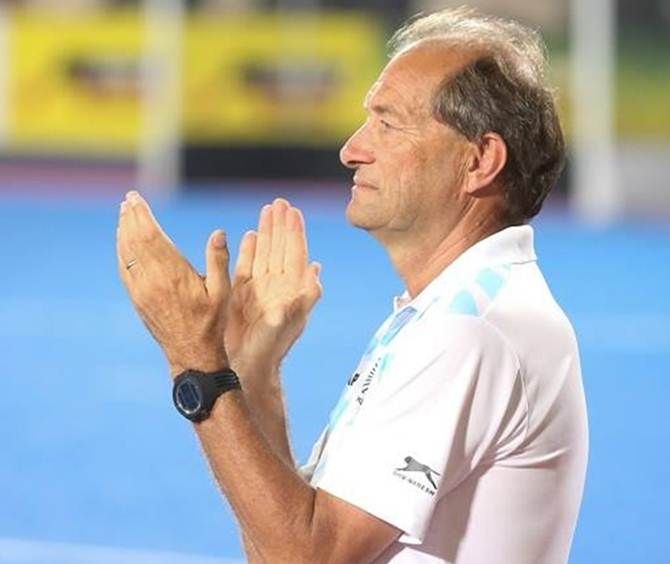12 teams have been divided into two pools of six, each team playing round-robin games within their pool.
The top four teams from each pool advance to the quarter-finals.

Roelant Oltmans, the Indian men's hockey team’s chief coach, says the new competition format of having quarter-finals in place of direct semi-finals at the upcoming Rio Olympics is not only beneficial for the Men in Blue but all small teams too.
"If you have teams like Argentina, Germany and Holland in your group, it becomes that difficult to end up being the top two teams in your group. It is not impossible to qualify; but now if you finish in top four, you have a chance to play in the quarter-finals," opined Oltmans.
"This format will give India and every other team, including Canada, a feel that they have a greater chance of making it to the quarter-finals," he added.
Unlike previous editions, the International Hockey Federation (FIH) has introduced a new competition format in this year's Olympics.
As per the new format, 12 teams have been divided into two pools of six, with each team initially playing round-robin games within their pool.
Following the completion of the round-robin games, the top four teams from each pool will advance to the quarter-finals.
Previously, after completion of round-robin games the top two teams from each pool used to directly qualify for the semi-finals.
In a significant but surprise move, Hockey India named senior goalkeeper P R Sreejesh captain of the national team for the Rio Olympics in place of long-standing skipper Sardar Singh.

Asked about the logic behind the decision, the Dutchman said the move to relieve Sardar from captaincy was purely taken to free him from excess responsibilities.
"I can assure you the group dynamics are good or may be even better under actual circumstances. Sardar can now completely focus on his game, and let the rest of the players shoulder more responsibility. This exactly was the aim when we discussed it (replacing Sardar with Sreejesh)," he said.
"Sardar along with (vice-captain) S V Sunil, V R Rahunath, Manpreet Singh and Sreejesh forms a group of captain. I believe it is a positive endeavour," Oltmans added.
The 16-member Indian team has a mixture of youth and experience. It consists of seven players who played in the 2012 London Olympics while nine new faces were inducted.
Asked whether the players who were part of the London Olympics squad are sharing their experience with the new faces in the side, the coach said: "They have experience but the problem is their experience is not positive. They had played 2012 Olympics and unfortunately that was not the best Olympics for India. So they bring quite negative thoughts."
To overcome the problem, Oltmans said he shares his successful Olympics experiences with the youngsters.
"I have a very good and positive experience of playing in the Olympics and therefore I share my experience, discuss about it and talk about it to prepare the youngsters as good as possible."
India will miss the services of experienced defender Birendra Lakra in Rio after he failed to recover in time from a knee injury.
"I really wanted him (Lakra) to play, but if it is not possible, it is not possible. He is India's one of the best defenders," Oltmans said.
"However, it wouldn't be good for any team to heavily depend on one player. In a couple of tournaments, like in the Azlan Shah Cup in Malaysia and the Champions Trophy, we had to play without him as well and the replacements did well," he said.
The men's hockey team departs for Rio de Janeiro via Spain on Saturday night.











